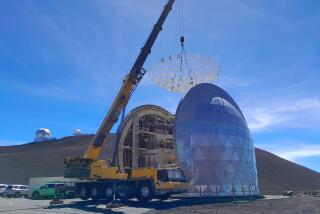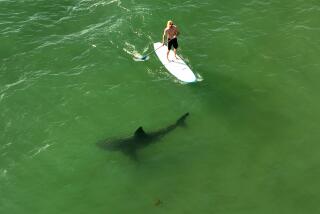Prospects Still Cloudy for Radio Observatory
A pall of uncertainty still hangs over the 25-year-old Clark Lake Radio Observatory near Borrego Springs, which has lost its funding because of National Science Foundation cutbacks.
Although the unique deep-space observatory, credited with identifying celestial objects 15 billion light-years away by monitoring radio waves, will continue to operate through the end of June, it is counting on a $50,000 contract from the Navy to keep operations limping along, said M.J. (Mike) Mahoney, resident director of the observatory.
âWeâre basically operating assuming that this proposal put in to the Navy will go through,â Mahoney said.
Still, officials admit that prospects for permanent funding are dismal.
The facilityâs owner, the University of Maryland, is unable to continue funding the observatoryâs $400,000 annual budget because of cutbacks by the National Science Foundation, said Roz Hiebert, a spokeswoman for the university.
Although university officials are soliciting grants from corporations, Mahoney said he is pinning his hopes on obtaining more military contracts in October, when the federal governmentâs fiscal year begins. The problem is to obtain short-term funding to keep the observatory functioning through the summer.
âWeâre trying to do the best we can,â said the physicist who, along with three other scientists, runs the observatory 12 miles northeast of Borrego Springs.
The facility consists of 720 antennas, each 26 feet tall, that dot the desert floor in the shape of a giant T nearly two miles long and one mile wide.
âWe desperately need someone to bail us out through the summer,â Mahoney said.
The Navy and other branches of the military are interested in the observatoryâs work because it has conducted research on the ionosphere, the outermost layer of the Earthâs atmosphere, which has a role in the effectiveness of over-the-horizon radar. The Clark Lake Observatory is the only facility outside the Soviet Union that is collecting signals from the lowest part of the radio spectrum that are able to penetrate the ionosphere.
Mahoney and the three other scientists are bitter that the federal grants were cut off so abruptly after many of them have spent more than 10 years researching at the observatory.
âItâs absolutely incomprehensible how a federal agency can fund a project for all those years and then say theyâre not going to fund us,â Mahoney said. âSomehow, they are going to have to justify this.â






